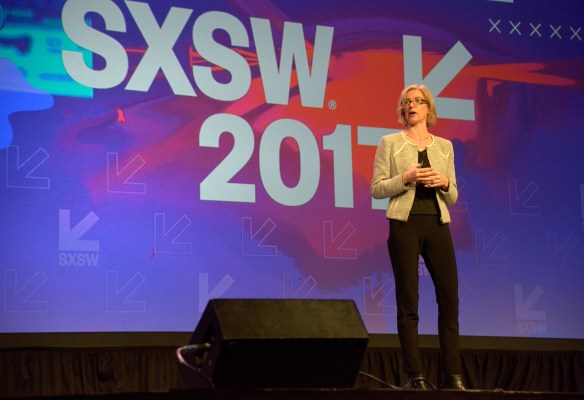Jennifer Doudna, co-inventor of CRISPR Cas9 technology, or the ability to program genes using a special enzyme, spoke about the promises of this technology onstage at SXSW this afternoon. In a keynote today, Doudna noted that while this technology is very young (less than five years old), “it’s been deployed very rapidly for existing applications.”
For example, CRISPR Cas9 tech has important applications for treating diseases. One of the first applications we’ll see entering clinical trials, Doudna said, is using Cas9 gene editing tech to correct the mutation that causes sickle cell disease.
Another example is using the tech to create gene drives, which entails driving a trait through a population very quickly. Doudna said it’s already being deployed in the lab setting to make changes to insects that carry diseases, such as mosquitoes that carry certain pathogens.
“In the future, we could create mosquitoes impervious to infections and therefore prevent spreading diseases,” Doudna said.
Then, of course, there’s the use of gene editing in human embryos, which has attracted a lot of attention in the last few years. For example, the tech could be used to make changes to the immune systems of people with cancer, and make them more capable of fighting the disease.
The University of California Berkeley professor and founder of biotech startup Caribou Bioscience was until recently embroiled in a hotly contested two-year patent battle with the Broad Institute of MIT and Harvard over key portions of the technology, namely the ability to edit living cells.
The Broad Institute won in that case last month, but, as Doudna pointed out to TechCrunch shortly after the decision went public, it still allows her team and the company she founded to work with the technology in a variety of ways.
CRISPR is a technology potentially worth hundreds of billions, if not trillions, as it could change entire industries. While the Broad Institute won the rights to its patent under a “no interference” ruling, UC Berkeley must still obtain the more basic CRISPR patent. Should that happen, companies interested in using the technology would likely have to pay both institutions for the rights.
During her keynote, Doudna noted how the development of this technology has been a very collaborative effort between professors, academic institutions, regulators, students, etc.
What ultimately creates the most stress for her is the fear that people will get out ahead of the tech, “getting so excited they start to deploy it before it’s even ready,” Doudna said. “I worry most about that kind of overextension that might lead to some sort of harmful effect that would then turn the public against it.”
